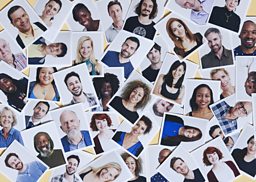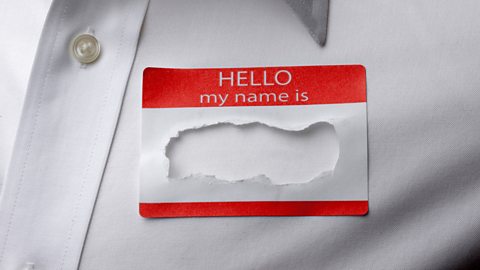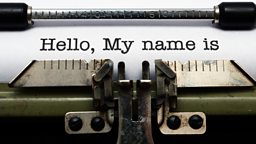When people get your name wrong
Our name is a deeply personal thing. A string of specific sounds inextricably tied with our identity.
No wonder so many of us take offence when someone gets it wrong.
And yet, we find other people’s so hard to remember – and just can’t seem to get them right.
On Word of Mouth, Michael Rosen is joined by ����ý journalist Dhruti Shah and linguist Dr Laurel MacKenzie to discuss why personal names are so often mispronounced or misspelt, in conversation and online.
Word of Mouth

Listen to When people get your name wrong, with Michael Rosen, his guests, and lots of stories from the Word of Mouth audience.

Most of us have experienced our name being mangled and mispronounced
“A few years ago, I was really perturbed to discover that autocorrect – you know that technology that’s supposed to make life so much easier – it couldn’t distinguish between Dhruti and a Dorito. Dorito is a tortilla chip brand. It was so awkward,” says Dhruti Shah.
The journalist wrote an article titled “Called the wrong name at work? Awkward...” in which she got other people to share their experiences. She heard from a woman called Montserrat who got referred to as “Monster Rat”, along with many others. The article went viral. It seems every one of us has a story about our name being mangled, mispronounced or misspelt.
“There’s so much going on that makes names difficult to learn as well as to remember,” says Dr Laurel MacKenzie, Assistant Professor of Linguistics at New York University. “If you have trouble with other people’s names it’s not just you, you’re really in good company.”
Why do we find names so hard?
There are a few factors that “conspire to make names cognitively difficult,” says Laurel.
- No frame of reference
In an experiment, if subjects are told someone is a baker versus their name is Baker, they will find it much easier to remember the occupation than the name. Even when those two things are identical. With an occupation we have a frame of reference: we hear “baker” and we picture someone in an apron surrounded by cakes and bread. It sticks. But names pick out someone specific, rather than a generic group, and this makes them harder for our brains.
- No synonyms
There are synonyms for common names (objects). For example, a car could also be called a “saloon”, a “vehicle” or a “Volvo”. It has specific names as well as more generic names for the same thing. With personal names we don’t have anything like that to help us.

Which old English names did we abandon?
Dr Laura Wright talks through the old English names we abandoned in favour of French ones
- No set syllables, sounds or spellings
And names come from a very “wide phonological set”: there’s a whole lot of variation in what a name looks like. They can vary from one syllable to many more, they can have all sorts of different sounds in them, and they can be spelt in different ways.

Why do we get names wrong in the way we do?
There are a few common mistakes we make around names.
- We revert to what we know
“There’s a real frequency effect with names,” says Laurel. She tells people her name has an “l” at each end, but constantly finds she gets called Lauren. That’s because it’s a much more common name, which people are familiar with.
- We aren’t aware of the linguistic origins
Names come from many different origins and linguistic backgrounds. This means new spelling conventions that native English speakers aren’t accustomed to seeing. “Michael” is a great example of this, with the “ael” that comes from Hebrew. The name gets misspelt because we’re used to a more common “eal” ending, which we see in words like “steal”.
- We choose the wrong spelling from multiple options
The UK and US are not like some other countries where names have to be chosen from a government mandated list. There is enormous amount of variation in the naming space in terms of which names are given and which spellings are used for them. “Practically anything goes in personal naming in English speaking countries,” says Laurel. The linguist’s surname is MacKenzie, which she spells with an “a” and a capital “k” (very personal and meaningful to her and her family), but which others spell differently.
Repeatedly getting someone’s name wrong can be a “microaggression”
Being bestowed with the wrong name can be “super awkward,” says Dhruti. “Some people let it go on for years because they just don’t know how to deal with it.” But it goes deeper than mere embarrassment.
An experience like Nana’s, where his name wasn’t respected, can be considered a microaggression.
Dhruti spoke to Nana, who used to work in the civil service. His colleagues began to call him Nandos, which he wasn’t happy about, but after repeatedly trying to correct them and getting nowhere, he realised he’d have to let it go. An experience like Nana’s, where his name wasn’t respected, can be considered a microaggression. These are everyday slights and indignities, especially aimed at people from marginalised groups.
Dhruti also spoke to business psychologist Binna Kandola, who had been called Pina Colada in the past. “He made the point that if people consistently get your name wrong, then they’re robbing you of your identity,” says Dhruti. “They are suggesting you don’t matter.”

Is autocorrect racist?
As Dhruti found, autocorrect is not always our friend when it comes to names. And on a serious note, it raises issues around privilege and power.
Professor Rashmi Dyal-Chand recently published a paper exploring how autocorrect presumes whiteness. Dyal-Chand wrote, “Sometimes autocorrect changes names to their closest Anglo approximations (as in Ayaan to Susan). Sometimes it suggests replacements that are not proper names (as in DaShawn to dash away). Often, autocorrect asserts the implausibility of non-Anglo names by underlining them in red.”
“That can have totally harmful effects,” says Dhruti, “especially for those who are already at a disadvantage in society.”
Dhruti tracked down Dean Hachamovitch, an inventor on the Microsoft patent for autocorrect, to get his take on the issue. “All tools make assumptions,” he says. “I agree that inherent biases in data as well as algorithmic logic and those biases typically reflect the people and organisations that produce the system. Most power rests with the teams that produce the technology.”
“While most of the time there’s some capacity for users to take ownership, that’s nowhere near the power of choosing a default setting for a billion people.”
What can we do to get better at names?
We may not be able to change the autocorrect algorithms, but there are things we can do to ensure we get names right.
We all learn 'Daenerys Targaryen', right? So we can learn 'Dhruti' if we need to.
Practice makes perfect, says Laurel. We can learn names that are culturally unfamiliar to us when they’re important enough to us. “If people can learn names of footballers that might feel unfamiliar or foreign to them, they can learn their colleague’s name,” says Laurel. “We all learn Daenerys Targaryen, right? So we can learn Dhruti if we need to.” If there’s someone who sits next to you in the office and you don’t think you’re getting their name right, practise it, says the linguist. “Talk to them in front of the mirror as if they are there. Go over it again and again. It’s a considerate thing to do and it does make a difference.”
“I think this is a matter of compassion and listening and working together with someone,” she says. “If you really want to get someone’s name right, you can get it right.”
If you’re unsure about how to pronounce a person’s name, just ask, says Dhruti. “It’s about trying. It’s not about getting into conflict and it’s not about arguing.” If you keep getting someone’s name wrong it’s just rude, says the journalist. “If you don’t know, just ask. We can work together.”
When people get your name wrong: listen to the programme or download the podcast now.
Exploring language on Radio 4
-
![]()
Word of Mouth
Series exploring the world of words and the ways in which we use them.
-
![]()
The Great Apostrophe Quiz
An entertaining quiz to illustrate the trickiest of punctuation elements – the apostrophe.
-
![]()
Women and words: why language matters
How sexism is reflected in the English language and why the words we choose are important.
-
![]()
So you think you know more grammar than your children?
Test your grammar knowledge with our user-friendly quiz which is based on Year 6 SATs-style questions.




